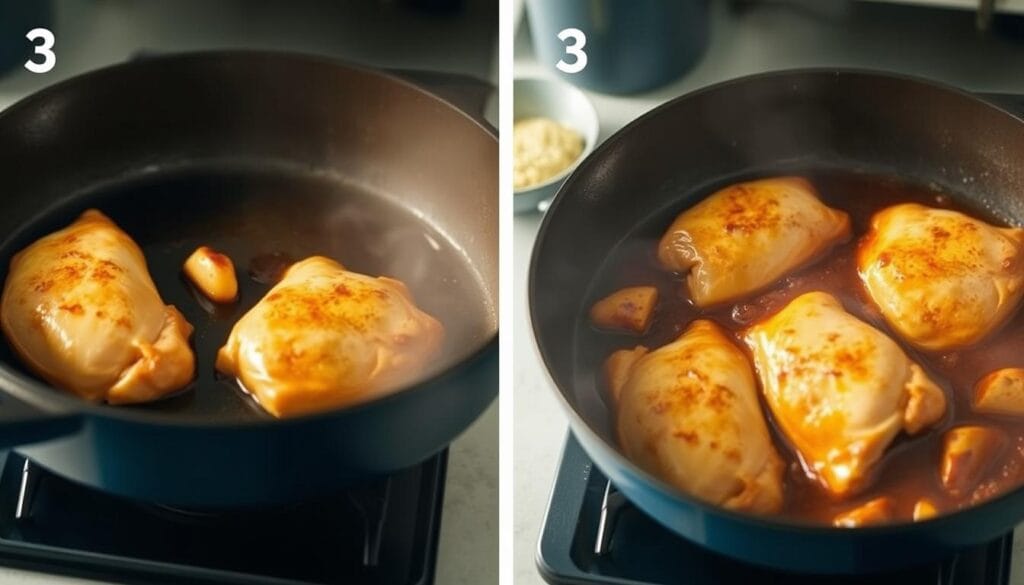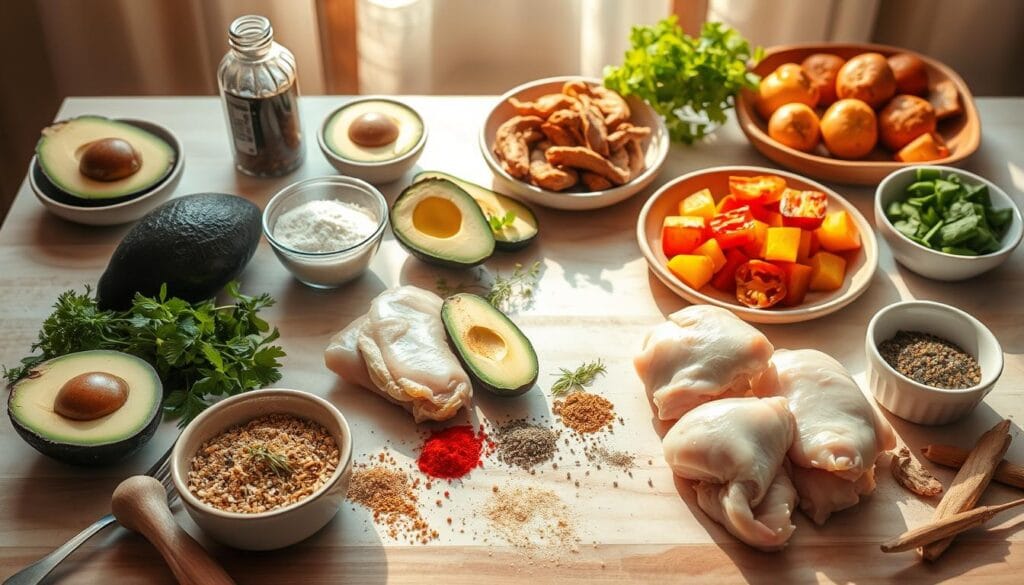Ever stare at the clock at 5 p.m., wondering how to get dinner on the table without sacrificing flavor? We’ve all been there. Between work, errands, and life’s chaos, cooking often feels like a chore. But what if you could create a meal that tastes like it simmered all day—in half an hour?
This smothered chicken thighs recipe transforms bone-in cuts into tender, fall-off-the-bone goodness. The secret? A rich sauce made with savory broth and aromatic spices. No fancy techniques—just straightforward steps that let the ingredients shine. Perfect for nights when time’s tight, but your taste buds demand more.
Why bone-in? It locks in moisture, ensuring every bite stays juicy. Paired with a creamy pan sauce, this dish feels indulgent yet comes together effortlessly. Best of all, you’ll need just one skillet and pantry staples to pull it off.
Key Takeaways
- Cook a restaurant-worthy meal in 30 minutes with minimal prep
- Bone-in pieces stay moist and absorb flavors better than boneless
- Use broth to build depth in your sauce without heavy cream
- Customize spices to match your family’s preferences
- Ideal for hectic weeknights or casual weekend gatherings
Overview of This Quick and Delicious Recipe
Picture this: a hearty meal that’s steeped in tradition yet ready faster than takeout. Born in Southern kitchens, smothered dishes originally simmered for hours. Modern cooks reshaped this comfort-food staple into a 30-minute marvel without losing its soul-warming essence.
Introduction to the Recipe
Garlic’s bold aroma meets golden flour-coated pieces in this flavor-packed dish. The spice blend—think paprika, onion powder, and black pepper—creates a crust that locks in juices while cooking. A splash of broth then builds a velvety sauce that clings to every bite.
Why This Weeknight Dinner Works
You won’t need chef-level skills here. Clear instructions guide you from stovetop searing to simmering perfection. Pantry staples like flour and spices do the heavy lifting, cutting grocery runs.
Timing matters most on busy nights. Prep and cook phases flow seamlessly, letting you multitask. No babysitting the pan—just occasional stirring while the sauce thickens. Serve it over rice or mashed potatoes, and dinner’s done.
Perfecting Smothered Chicken Thighs: Tips and Tricks
The secret to a golden crust lies in the prep work you do before the pan even heats up. Start by patting your meat thoroughly dry with paper towels—moisture is the enemy of crispiness. Generously season both sides with salt and pepper, pressing the spices into the surface for better adhesion.
Choose an oil with a high smoke point, like avocado or grapeseed, and preheat your skillet until it shimmers. This creates instant searing action, locking in juices while forming that crave-worthy caramelization. If the pan smokes, lower the heat slightly to avoid burning.
Slice onions uniformly—thin half-moons cook evenly and melt into the sauce. For deeper flavor, sauté them until golden-brown before deglazing. Measure liquids like broth or cream using a standard cup to maintain the sauce’s balance—too much liquid dilutes flavor, while too little risks dryness.
Struggling with uneven cooking? Avoid overcrowding the pan. Cook in batches if needed, keeping finished pieces warm in a 200°F oven. If your crust sticks, wait—properly seared meat releases naturally when ready to flip. Test doneness with an instant-read thermometer (165°F internally) for foolproof results every time.
The Key Ingredients for Rich Flavor
What transforms simple ingredients into a meal that lingers on your taste buds? It’s the harmony of pantry staples working together. Each component builds layers of savory depth, turning weeknight cooking into something extraordinary.
Essential Pantry Items and Spices
Chicken broth forms the backbone of your sauce, adding umami without heaviness. Combine it with garlic powder and smoked paprika for earthy warmth. A splash of heavy cream balances acidity while creating a velvety texture.
Flour acts as your thickening agent, ensuring the gravy clings to every bite. Medium heat coaxes out flavors without scorching spices. If using the oven, lower temperatures help meld ingredients slowly for deeper complexity.
Ingredient Substitutions and Variations
Swap bone-in cuts for boneless options—just reduce cooking time to prevent dryness. Vegetarian broth works if you’re out of chicken stock. For heat lovers, add cayenne or chipotle powder to the spice blend.
Dairy-free? Coconut milk mimics cream’s richness beautifully. Adjust garlic levels based on preference, but don’t skip the onion—it’s crucial for sweetness. Remember: spices should enhance, not overpower. Taste as you go, adding pinches until the balance feels right.
Step-by-Step Cooking Process
Ready to turn your kitchen into a flavor factory? Let’s break down the process into foolproof stages. You’ll need measuring cups, a skillet, and attention to timing—every minute counts when building rich taste in record time.

Prepping and Seasoning the Protein
Pat your meat dry with paper towels—moisture blocks seasoning from sticking. Mix 1½ tablespoons of paprika, garlic powder, and black pepper in a bowl. Coat each piece evenly, then dust with all-purpose flour for a crisp crust that locks in juices.
Searing and Oven Finishing
Heat 2 tablespoons of oil in an oven-safe skillet over medium-high. Sear pieces for 4 minutes per side until golden. Pour in ¾ cup of broth to deglaze the pan, scraping up browned bits for extra flavor. Transfer the skillet to a 375°F oven for 12-15 minutes.
Use a timer religiously here. Overcooking dries out meat, while undercooking risks food safety. Balance fat content by measuring liquids precisely—too much cream makes the sauce heavy, while too little broth weakens depth. Let rest 5 minutes before serving to redistribute juices.
Crafting the Creamy Sauce
The magic happens when butter meets flour in your skillet. This golden mixture forms the foundation of a sauce that elevates any dinner. Follow these no-fuss instructions to create velvety gravy with restaurant-quality depth.
Building the Roux for Depth
Melt 3 tablespoons of butter over medium heat. Stir in an equal amount of flour, whisking constantly for 90 seconds. The ideal roux resembles wet sand—blonde for mild flavor, amber for nutty richness. Pro tip: Use a silicone spatula to scrape every corner of the pan.
Achieving the Ideal Gravy Consistency
Slowly pour 1½ cups of broth into the roux, whisking vigorously to prevent lumps. Once smooth, add ¼ cup of cream in a thin stream. Simmer 3-4 minutes until the sauce coats the back of a spoon. Too thick? Add broth 1 tablespoon at a time. Too thin? Cook 2 minutes longer.
| Common Issue | Quick Fix | Prevention Tip |
|---|---|---|
| Lumpy texture | Strain through a sieve | Whisk while adding liquids |
| Bland flavor | Add ½ tsp onion powder | Toast roux 30 seconds longer |
| Separated sauce | Blend with immersion mixer | Maintain medium-low heat |
Pair this rich gravy with fluffy mashed potatoes or buttery rice. For lighter dinners, try cauliflower mash or zucchini noodles. The sauce’s versatility makes it a star in multiple recipes—double the batch and freeze leftovers for future sides.
Customizing Your Dish for Dietary Needs
Your family’s preferences and health goals shouldn’t lock you out of enjoying comfort food classics. With smart swaps, this recipe adapts to low-carb lifestyles without losing its soul-warming appeal. Let’s explore how to tweak ingredients while keeping flavors bold and satisfying.

Low Carb and Keto-Friendly Options
Ditch traditional flour by using almond or coconut flour for coating. These alternatives create a crispy crust with 75% fewer carbs. Swap heavy cream with full-fat coconut milk—it adds richness while keeping net carbs under 3 grams per serving.
For thicker gravy without grains, blend 1 tsp xanthan gum into simmering broth. This creates the same velvety texture as roux-based sauces. Need more protein? Double the portion size—the juicy cuts stay keto-approved.
| Standard Ingredient | Keto Substitute | Benefit |
|---|---|---|
| All-purpose flour | Almond flour | Cuts 15g carbs/serving |
| Heavy cream | Coconut cream | Dairy-free option |
| Potato side | Mashed cauliflower | 90% fewer carbs |
Keep printed recipe cards handy for quick reference. Jot substitutions directly on the page—this saves time during busy weeknights. The comfort factor remains intact through slow-cooked aromas and tender textures, proving dietary restrictions don’t mean flavor sacrifices.
Experiment with smoked paprika or nutritional yeast to boost umami without added sugars. These tweaks let everyone enjoy the meal’s signature richness, regardless of their eating plan. Remember: successful customization starts with balancing moisture and spice ratios—taste as you adjust!
Serving Suggestions and Side Pairings
Transform your weeknight plate into a Southern-inspired feast with sides that balance texture and taste. The right accompaniments turn a simple dish into a memorable meal, highlighting its savory notes while adding visual appeal.
Flavor Bridges That Shine
Mashed potatoes remain the ultimate partner, their creamy texture soaking up every drop of gravy. For a rustic twist, mix in roasted garlic or a pinch of black pepper. Steamed green beans or glazed carrots add vibrant color and crunch, cutting through the dish’s richness.
Rice varieties like jasmine or wild grain absorb the sauce beautifully. Try dusting cooked rice with paprika for a smoky accent. Cornbread muffins brushed with honey butter offer sweet contrast—perfect for mopping up leftover seasoned flour gravy.
Stick to tradition by using all-purpose flour in your sides. It ensures biscuits stay flaky and fried okra stays crisp. For gatherings, arrange sides on a large platter with the main protein at the center. Garnish with fresh parsley or chives to elevate presentation without extra work.
- Drizzle gravy over mashed potatoes before plating
- Serve collard greens with apple cider vinegar for tang
- Layer rice in a ring mold for restaurant-style flair
Troubleshooting and Pro Cooking Tips
Even experienced cooks hit snags—here’s how to pivot like a pro. If your sauce separates, whisk in 1 tsp cornstarch mixed with cold water. Bring it to a gentle simmer while stirring. This thickens gravy without altering its rich flavor.
Stick to medium-high heat when browning. Too low, and you’ll steam instead of sear. Too high, and spices burn. Use an instant-read thermometer to confirm 165°F internally. Bone-in pieces need 3-4 extra minutes compared to boneless.
| Issue | Solution | Prevention |
|---|---|---|
| Tough meat | Simmer 5 mins longer with broth | Don’t skip the flour coating |
| Bland sauce | Add ¼ tsp smoked paprika | Toast spices before adding liquid |
| Soggy crust | Finish in oven at 400°F | Pat pieces dry thoroughly |
For boneless cuts, reduce cook time by 25%. Keep sauce quantities identical—the extra surface area absorbs more flavor. Leftovers? Reheat gently with a splash of broth to revive moisture.
When using a cup heavy cream, temper it with hot broth first to prevent curdling. This technique works across various chicken recipes, ensuring silky textures every time. Store cooled gravy separately to maintain ideal consistency upon reheating.
Variations and Substitutions in the Recipe
Craving something new but love the classics? Let’s reinvent your go-to meal. This adaptable dish welcomes swaps—from protein choices to sauce tweaks—while keeping its comforting soul intact.
Swapping Proteins Without Losing Flavor
Prefer white meat? Skinless breasts cook 25% faster than bone-in cuts. Keep the heat medium-low to prevent drying. For legs, extend searing by 2 minutes per side to render fat.
Pork chops make a tasty alternative—sear thick cuts 6 minutes per side, then simmer in gravy until tender. Adjust broth quantities slightly to account for varying juices.
Sauce consistency shifts with ingredient ratios. Use extra butter for silkier texture, or reduce cream by half for lighter meals. Double the onion if you crave sweetness—they caramelize into the gravy, adding depth.
| Protein | Cooking Time | Sauce Adjustment | Flavor Note |
|---|---|---|---|
| Breasts | 18-20 mins | +1 tbsp butter | Lighter, leaner |
| Legs | 22-25 mins | +2 tbsp cream | Richer, juicier |
| Pork | 24-28 mins | +½ onion | Savory, robust |
Vegetarian? Try portobello mushrooms, adjusting cook time to 8 minutes. Their meaty texture holds up well to gravy. Always taste and adjust spices after switching proteins.
Don’t fear substitutions—they’re gateways to new favorites. Stick to the core technique: proper searing and gradual sauce thickening. Your creativity shapes the dish, but the method ensures success every time.
Conclusion
Transform your weeknight dinner routine with a dish that’s both effortless and unforgettable. By blending pantry staples like garlic powder and smoked paprika, you create layers of flavor in under 30 minutes. Precise measurements—think two tablespoons of broth and a teaspoon of seasoning—ensure every bite strikes the perfect balance between rich and comforting.
Mastering this recipe hinges on smart cooking methods. A proper sear locks in juices, while gradual sauce thickening guarantees velvety texture. These techniques, paired with clear instructions, let you achieve tender results rivaling any restaurant entrée.
Whether you’re new to the kitchen or a seasoned cook, this meal adapts to your schedule without compromising taste. Share it over rice or mashed potatoes for a hearty dinner that feels special yet requires minimal effort.
Ready to elevate your weeknights? Whip up this crowd-pleaser, then tag us in your creations. One bite, and you’ll understand why it’s become a staple in busy households across the country.
FAQ
Can I use boneless cuts instead of bone-in for this recipe?
What’s the best way to thicken the gravy if it’s too runny?
How can I make this dish dairy-free without sacrificing creaminess?
Are there low-carb alternatives to serve with this entrée?
Why does my seasoned flour clump when searing?
Can I prepare this ahead for meal prep?
External Resources for Best Results:
- USDA Chicken Breast Nutrition: https://fdc.nal.usda.gov/fdc-app.html#/food-details/171705/nutrients
- National Cancer Institute on Broccoli Benefits: https://www.cancer.gov/about-cancer/causes-prevention/risk/diet/cruciferous-vegetables-fact-sheet
- Safe Grilling Tips: https://www.fsis.usda.gov/food-safety/safe-food-handling-and-preparation/grilling-safety
Looking to explore more healthy chicken bowls, low-carb chicken recipes, or broccoli recipes for dinner? Head over to www.whatfordinner.com for expert-crafted, nutrition-focused meal ideas.


9xuj38
Very interesting details you have noted, appreciate it for posting. “She had an unequalled gift… of squeezing big mistakes into small opportunities.” by Henry James.
Only a smiling visitant here to share the love (:, btw great layout. “The price one pays for pursuing a profession, or calling, is an intimate knowledge of its ugly side.” by James Arthur Baldwin.
ixp97c
phrzuw
Spot on with this write-up, I really assume this web site needs far more consideration. I’ll most likely be once more to learn way more, thanks for that info.
I wanted to post you this little word so as to give thanks the moment again for these marvelous tips you’ve documented at this time. It’s certainly unbelievably generous with you to provide unhampered exactly what numerous people would have offered for sale for an e-book in order to make some profit on their own, mostly considering the fact that you might well have done it if you desired. Those good tips also served to become a good way to recognize that most people have the identical zeal similar to my very own to know the truth significantly more in terms of this issue. I think there are thousands of more pleasant instances up front for people who see your site.
I’ve been browsing online more than 3 hours lately, yet I never discovered any fascinating article like yours. It?¦s lovely value sufficient for me. In my opinion, if all site owners and bloggers made just right content as you probably did, the internet can be a lot more useful than ever before.
24rmj9
Hello, you used to write fantastic, but the last few posts have been kinda boring… I miss your super writings. Past several posts are just a little bit out of track! come on!
Of course, what a great site and informative posts, I surely will bookmark your site.Best Regards!
Everything is very open and very clear explanation of issues. was truly information. Your website is very useful. Thanks for sharing.
Thanks for sharing superb informations. Your website is very cool. I’m impressed by the details that you have on this web site. It reveals how nicely you understand this subject. Bookmarked this website page, will come back for extra articles. You, my pal, ROCK! I found simply the info I already searched all over the place and simply couldn’t come across. What an ideal web site.
Does your site have a contact page? I’m having trouble locating it but, I’d like to shoot you an e-mail. I’ve got some creative ideas for your blog you might be interested in hearing. Either way, great website and I look forward to seeing it develop over time.
Greetings! This is my first comment here so I just wanted to give a quick shout out and tell you I really enjoy reading through your articles. Can you suggest any other blogs/websites/forums that cover the same subjects? Thank you!
Hello! Do you know if they make any plugins to help with Search Engine Optimization? I’m trying to get my blog to rank for some targeted keywords but I’m not seeing very good success. If you know of any please share. Thank you!
What i do not realize is in truth how you are no longer really a lot more well-appreciated than you may be right now. You are so intelligent. You realize therefore considerably with regards to this matter, made me individually imagine it from a lot of numerous angles. Its like women and men don’t seem to be fascinated unless it?¦s something to do with Lady gaga! Your own stuffs outstanding. Always take care of it up!
It’s laborious to seek out knowledgeable folks on this topic, however you sound like you know what you’re speaking about! Thanks
Interesting blog! Is your theme custom made or did you download it from somewhere? A theme like yours with a few simple tweeks would really make my blog stand out. Please let me know where you got your design. Thanks